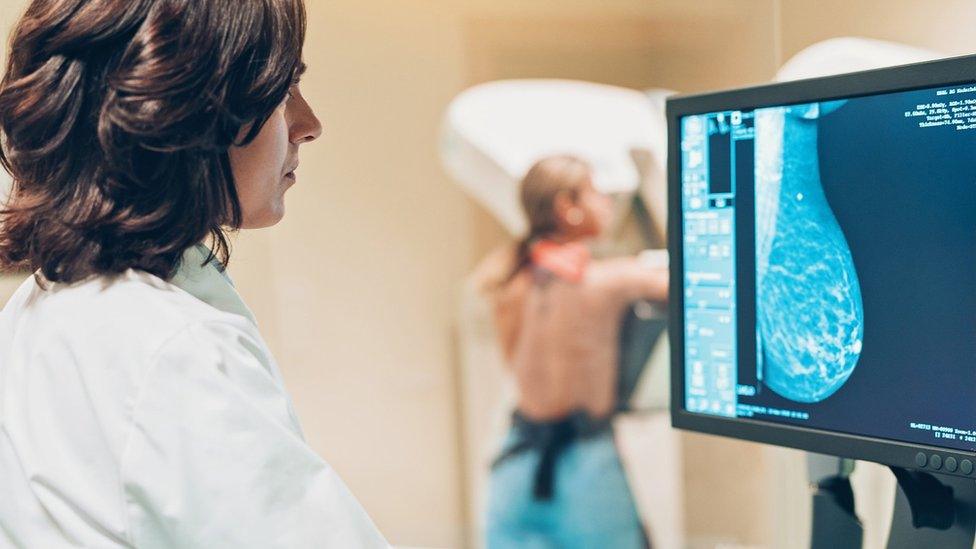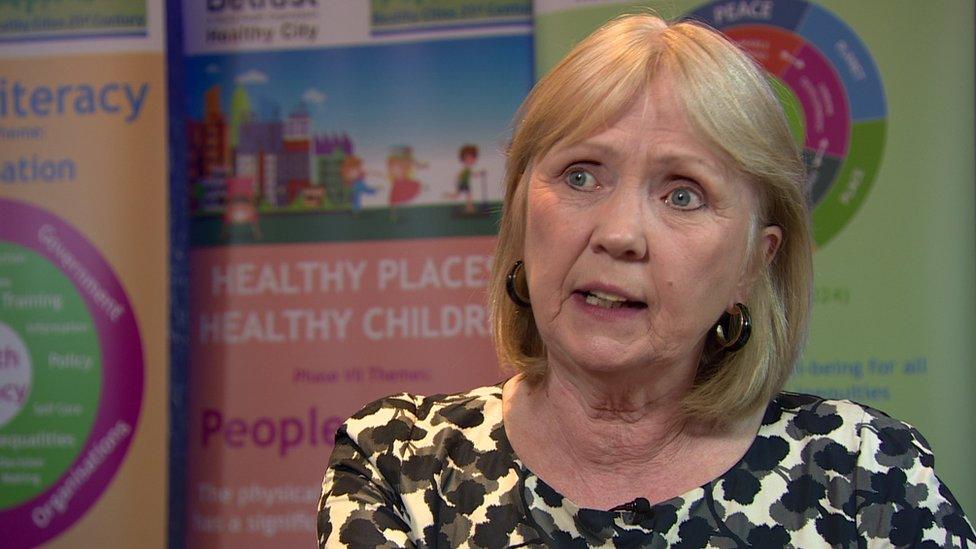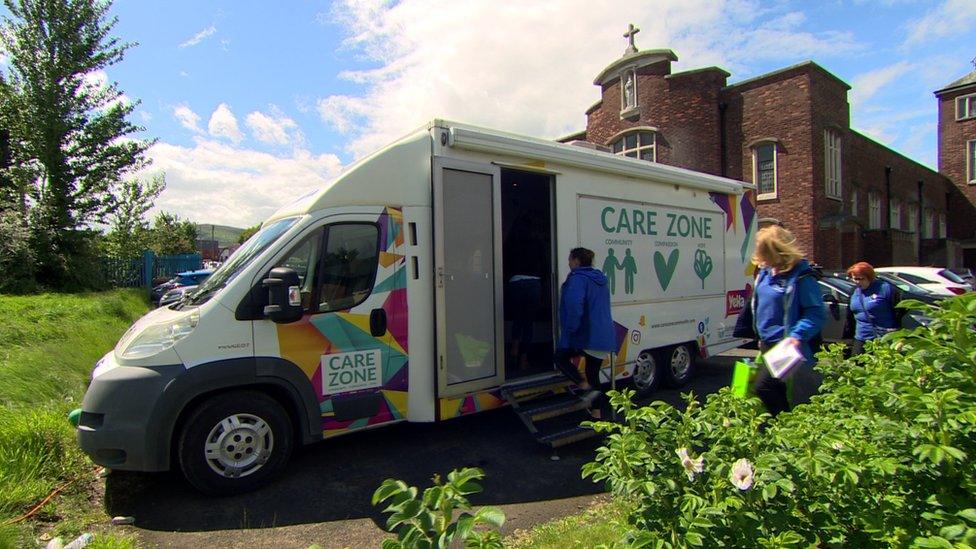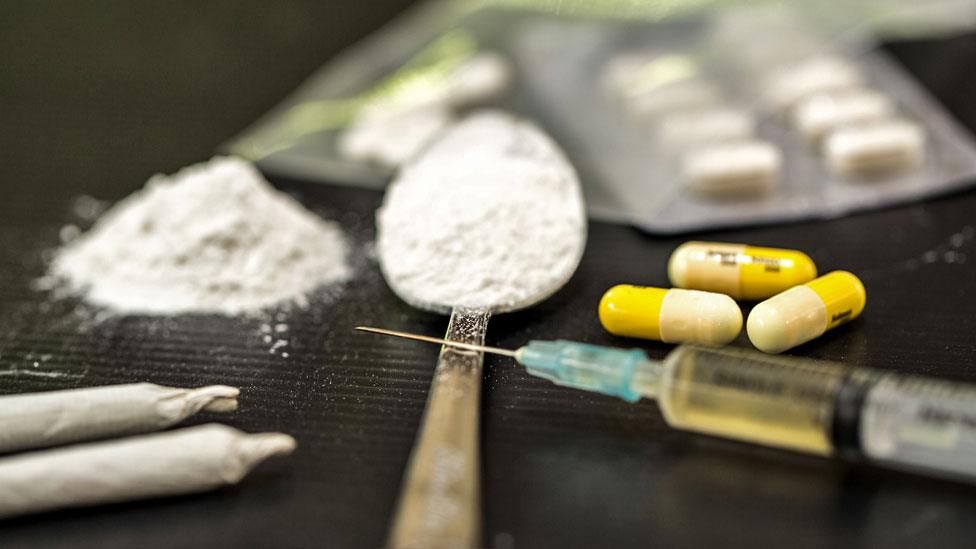Belfast has worst health outcomes in Northern Ireland, report finds
- Published

The study looked at a number of issues including cancer screening
Belfast has the worst health outcomes when compared with the rest of Northern Ireland, according to a report by Belfast Healthy Cities.
This includes issues around the mental health and avoidable deaths.
The Data Behind The People and The City report also found life expectancy was lower for men and women in Belfast, both at birth and at the age of 65.
Uptake for breast, bowel and cervical cancer screening was also worse, particularly in deprived areas.
In 2018-20, life expectancy in Northern Ireland was 78.7 years for men and 82.4 for women.
In Belfast, it was 75.8 years for men and 80.5 years for women.
The chief executive of Belfast Health Cities, Joan Devlin said the report contains "much information and learning" that they and others can build on.

Joan Devlin, chief executive of Belfast Health Cities, says "health is not only about the health service"
Data was sourced from a number of bodies, including Northern Ireland Statistics and Research Agency (NISRA); the Department of Health; Queen's University Belfast and Ulster University.
It covers the financial year 2019/20 or a data sampling point at March/April 2020.
Belfast Healthy Cities is a member of the World Health Organisation Network and its main goal is to make health a priority issue within the social, economic and political agendas of cities.
Ms Devlin added that "health is not only about the health service".
"If we look at how people access services, there is a high number of families, for instance in north Belfast, who don't have access to a private car and are highly dependent on public transport in order to access health services," she said.
"They might have to rely on taxis instead and this could be why they miss appointments, so access to public transport, to education and a job with an appropriate income are all key."

Lisa Fahy is a community champion who speaks up on behalf of men and women living in the area
In the heart of north Belfast, the Care Zone Project brings health to the street and on to people's doorsteps.
It comes in the shape of a mobile bus which is staffed with community care workers who advise on diabetes and can signpost to cancer screening and mental health services.
They have appointed "community champions" to speak up on behalf of men and women living in the area.
One such champion is Lisa Fahy, who describes locals as "resilient, who want to help themselves".
"Problems we are dealing with include cancer; mental health problems; COPD; asthma; addiction, like smoking and alcohol, and then diabetes - the list goes on."
Lisa said another challenge is accessing health services as often people "need to get two buses or a train which often is too difficult so they need a taxi which is all very expensive".

The Care Zone Project mobile bus travels to communities in north Belfast
She says often that means people miss their appointments.
Sean Devlin, who is on Care Zone's management team, added: "A real focus needs to be put on the area, health inequalities are the worst and have been the worst for decades, we need to make it a better place for people to live because ultimately that will change the statistics here in 10, 15, 20 years' time".
Life expectancy
Among Belfast's assembly areas, Belfast South had the highest life expectancy at birth for both men and women while Belfast West had the lowest life expectancy at birth for men and women.
The report examined risk factors to public health including cigarette smoking and alcohol use.
The percentage of people living in the Belfast Health Trust area and who reported drinking alcohol was higher than all other health trusts.
Men are three times more likely to be admitted to hospital for alcohol-related causes than women.
The report also shines a light on the low take-up of cancer screening services compared to the rest of Northern Ireland.
For cervical, breast and bowel screening, Belfast had the lowest uptake of services compared to all other areas across Northern Ireland.
Related topics
- Published13 April 2022

- Published23 September 2021
